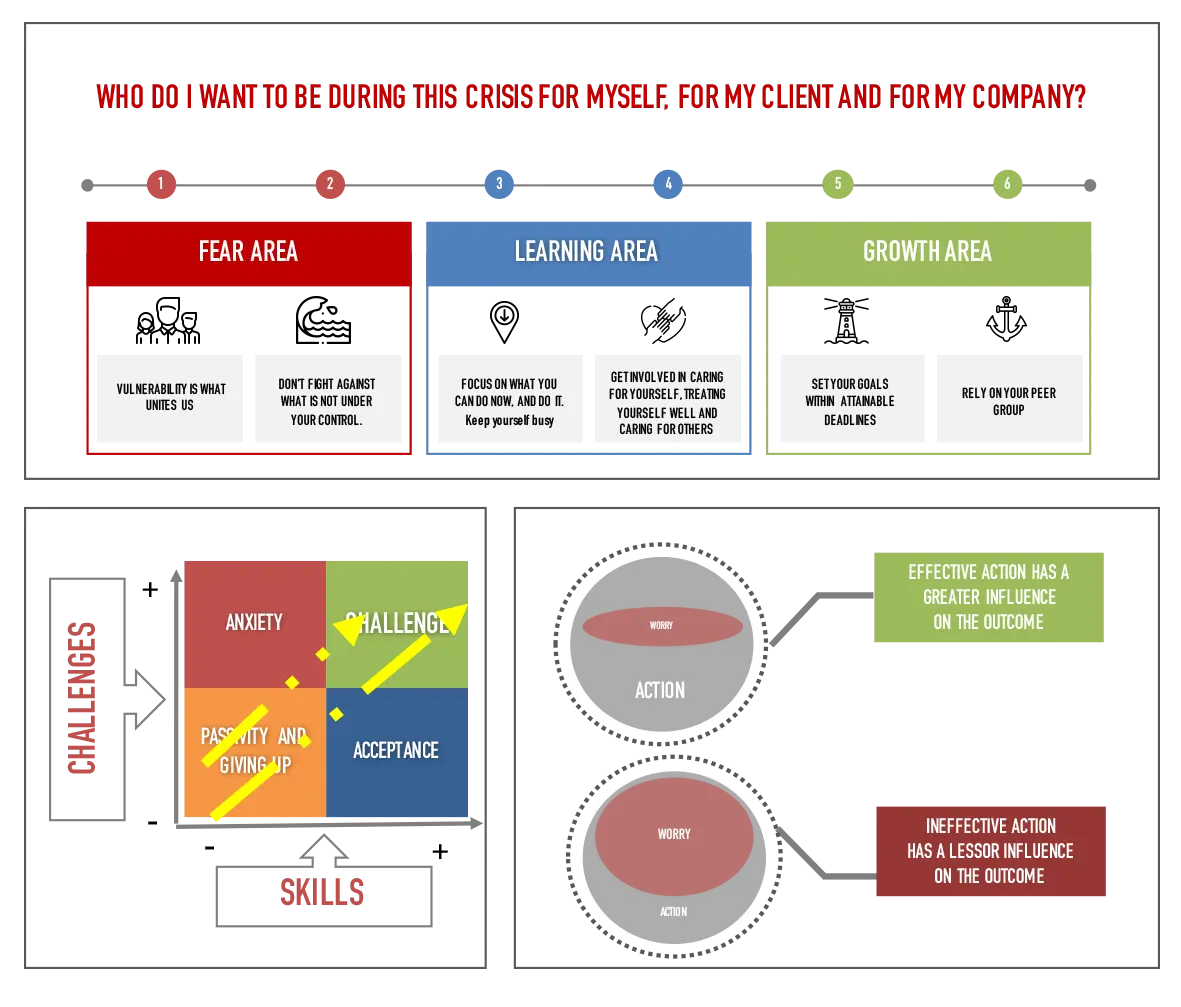Resilience, a competitive advantage in times of crisis

Eva Rodríguez
Being resilient means having the ability to adapt to problems, to rebuild and even to emerge from the experience stronger and having learned something new.
Is it the same as being resistant? Not exactly. Imagine a robust tree and a fragile reed beside it. When there is a strong gust of wind, the tree, although it remains upright, reaches a point where it cracks and can break up. The tree is resistant, but it ends up breaking up because it lacks something that the small reed does have: when the gust of wind comes, the reed bends, adapts, changes its position and, when the wind stops, returns to its previous shape without suffering any damage at all. The reed is resilient.
If resilience is defined as the positive transformation that a person undergoes in resisting and overcoming any adversity that arises, it seems obvious that, in times of crisis such as the current COVID-19 situation, it is a skill that we need to train people to acquire.
“The person who gets back up again is even stronger than the person who never fell over” Viktor Frankl
Let’s talk about the resilience variables that condition the different scenarios that may arise. If the challenges in our environment do not change or are limited, we may become inactive when facing the situation, or comfortable in it.
As the challenges become greater, depending on how developed our skills are, we may either become anxious, or rather we may identify a challenge to be taken on. In the words of UN Secretary-General António Guterres, we are living through the “hardest” challenge facing humanity since World War II so, initially, it is normal to feel anxiety, however strong our skills are.

However, if we push forward, we will see a challenge (or indeed several challenges) in this new situation, and seeing a challenge is different than seeing danger because it involves ability, inspiration, learning and growth.
The ability to perceive new challenges in a crisis situation enables us to face them and test different strategies.
Since the basic way to gain self-confidence is through experience, if we try new strategies that help us to succeed in the new circumstances, or that at least allow us to perceive some level of control over the situation, our self-esteem will improve. This will make us stronger and help us have a positive outlook on life, despite the difficult circumstances.
In every learning process, people go through stages and end up experiencing personal growth. Resilience is the skill that must be developed along the path between the initial fear of something unknown and the growth that occurs when managing, understanding, and incorporating new concepts.
During this crisis, in order to take the road to success, you need to consider who you want to be in this new scenario, and put in place strategies to grow and become the person you have chosen to be.
What strategies should you put in place to build resilience?
- Respect your feelings, they are normal and often felt by other people. Talk about them, accept that they are normal and feel part of a wide community.
- Self-awareness. Learn to recognize your thoughts and feelings. Reflect on whether they are useful or not, but don’t try to change them.
- Focus. Focus on what is under your control and influence. This is the key.
- Connect with your body. Breathe and take a step back. Practice a relaxation or meditation technique. Focus on yourself and on your motivations.
- Involvement. Be present in what you’re doing and pay attention to everything you do.
- Engagement. Forge your own personalized discipline for action and focus on creating a habit. Set realistic goals and meet them.
- Values. Reflect on what you value in your life and in your personal and professional environments and make the most out of the situation by clarifying your scale of values.
Worry: the main obstacle
Even if we are determined to put all of the above into practice, when we get to work, we are often plagued by worries about possible threats: How will the world change after the crisis? How will it affect my loved ones and how will it affect me? Will I be able to cope with these changes?
That moment when worry takes over is not new; we have felt it before. It is very similar to what happens in any new situation that could pose a threat. We have been through it before and it will happen again. Let’s consider the times when, in our lives, we’ve faced frightening situations and have successfully overcome them. How did we do it? What was our winning strategy? Did we think about things we couldn’t control? Or did we perhaps simply go into action? This is in fact what actually happened: we stopped worrying and started taking action and setting out to do what was in our power to achieve.
The sooner we stop worrying, the more opportunity you will have to take action and the more you will be able to influence the outcome through the effective action you take.
But what if I fail in my attempt to be more resilient?
When we begin to implement these strategies in our day-to-day lives, it’s quite possible that we won’t achieve much in the short-term. Success comes to those who don’t give up. It’s no big deal if it doesn’t go right the first time.
Moreover, in a crisis situation, it’s easier to make mistakes. Focusing on them and wallowing in guilt for having made them makes the problem worse. Instead of obsessing with the past and with what we’ve done “wrong,” let us normalize our own mistakes (and also others’ mistakes) and look for the lessons to be learned. This will enable us to face the present more effectively with more capacity and with greater optimism.
Each mistake allows us to:
- Take stock and identify the internal and external causes of the error
- Learn new things
- Look ahead to know what to do in the future
- Seek help, or find the inspiration to try again
APPLY THE FOLLOWING MAXIM “SOMETIMES YOU WIN AND OTHER TIMES YOU LEARN.”
What is our responsibility? Our emotions are as contagious as viruses themselves!
Even if it seems more logical to think that we are sad, despondent, and discouraged as a result of the current global scenario, which is why we apologize when we stop doing things or when we do inappropriate things. Our actions and feelings really go together and influence each other, but with a small nuance: actions are voluntary, feelings are not.
What we do or stop doing is subject to our own willpower and if we act positively and optimistically, our mood will automatically improve.
Also, we are programmed to infect other people with our emotions, and vice versa. It is a process that occurs mainly through our mirror neurons.
For the situation to improve, it is our responsibility to act in an optimistic and cheerful manner, seeking to move toward normality and not to give up. This is the only thing capable of reversing the spiral of fear, inactivity and sadness and transforming it into hope, optimism, activity and joy.
Take a few moments to reflect. What can you do? Give yourself the chance to see what you’re capable of achieving! Take action and seek satisfaction within yourself, focusing on your motivations!
